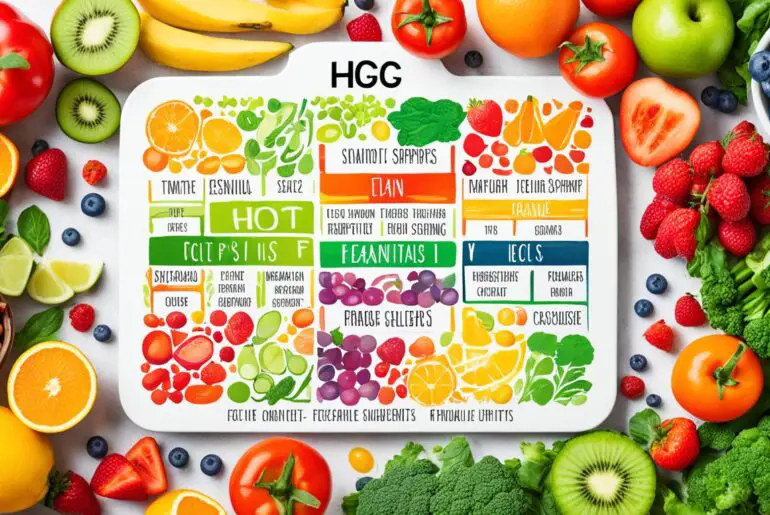Did you know that the HCG diet plan is one of the most controversial weight loss approaches? It has gained popularity in recent years, but its effectiveness and safety remain a topic of debate.
The HCG diet involves severe calorie restriction and the use of the hormone human chorionic gonadotropin (HCG) to promote weight loss. Advocates claim that it offers numerous health benefits, but is this really the case? Let’s delve deeper into the topic and separate fact from fiction.
Key Takeaways:
- The HCG diet plan is a controversial weight loss approach.
- The diet involves severe calorie restriction and the use of HCG hormone supplements.
- Advocates claim benefits such as rapid weight loss, improved metabolism, and reduced appetite.
- Scientific evidence supporting these claims is limited.
- The HCG diet comes with potential health risks and side effects.
The Use of HCG in the Diet Plan
The HCG diet plan incorporates the use of HCG hormone supplements, typically administered through injections, in conjunction with a very low-calorie diet. The purpose of this diet is to stimulate weight loss by targeting stored body fat and preserving muscle mass. Proponents of the HCG diet claim that it can improve metabolism and reduce hunger cravings, leading to effective weight loss.
However, it is important to note that the FDA does not approve the use of HCG for weight loss, and there is limited scientific evidence to support its effectiveness as a weight loss aid. The controversy surrounding the use of HCG in the diet plan stems from concerns about potential risks and lack of long-term efficacy.
“The use of HCG in the diet plan is controversial, and health experts warn against its potential risks and lack of long-term efficacy.”
While proponents argue for the benefits of the HCG diet, it is crucial to approach the plan with caution and consult with healthcare professionals. They can provide informed guidance on the risks and advantages of the HCG diet, helping individuals make informed decisions about their weight loss journey.
The Potential Benefits of HCG in the Diet Plan
Advocates of the HCG diet claim several potential benefits:
- Effective weight loss: Some individuals may experience rapid weight loss in the short term while following the HCG diet plan. This initial weight loss can provide motivation to continue on the weight loss journey.
- Improved metabolism: The use of HCG hormone supplements is believed to enhance metabolic function, leading to increased calorie burn and potentially facilitating weight loss.
- Reduced appetite: HCG is purported to have appetite-suppressing effects, which can help individuals adhere to the very low-calorie diet recommended in the HCG diet plan.
While these potential benefits may sound promising, it is crucial to note that scientific evidence supporting these claims is limited. The risks associated with the HCG diet should also be carefully considered.
The Importance of HCG in the Diet
The inclusion of HCG hormone supplements in the HCG diet plan is believed to play a crucial role in promoting weight loss. The hormone is thought to target stored body fat and spare muscle mass, thereby facilitating fat loss while preserving muscle integrity.
Despite these theories, it is vital to approach the use of HCG in the diet plan with caution. The FDA’s lack of approval and the limited scientific evidence underscores the need for further research and comprehensive understanding of the potential benefits and risks associated with HCG.
Potential Health Risks and Side Effects

The HCG diet is associated with several potential health risks and side effects that individuals should be aware of before considering this weight loss plan. The severe calorie restriction of the diet can lead to nutrient deficiencies, depriving the body of essential vitamins and minerals needed for optimal health. This can result in fatigue, irritability, and other physical and mental health issues.
List of Potential Health Risks and Side Effects:
| Potential Risks and Side Effects |
|---|
| Inadequate nutrient intake |
| Formation of gallstones |
| Irregular heartbeat |
| Electrolyte imbalances |
| Possible increased risk of certain cancers |
| Fluid buildup |
| Swelling of the breasts in males |
| Risk of blood clots forming and blocking blood vessels |
It is important to note that these potential risks and side effects are associated with the HCG diet and may vary in severity from individual to individual. Consulting with a healthcare provider before starting the HCG diet is crucial to fully understand the potential risks and side effects specific to your body and health condition.
While the HCG diet promises weight loss, individuals should carefully consider the potential risks and side effects before embarking on this plan. Safer and more sustainable alternatives to achieve weight loss exist, such as adopting a balanced diet that includes a variety of nutritious foods and engaging in regular physical activity.
Safer Alternatives for Weight Loss
If weight loss is your goal, there are safer and more sustainable ways to achieve it than the HCG diet. A balanced diet that includes a variety of nutritious foods is essential for overall health and weight management.
This involves consuming appropriate portions of protein, carbohydrates, and fats, as well as incorporating fruits, vegetables, whole grains, and lean sources of protein. Regular physical activity is also crucial for maintaining a healthy weight and improving overall wellness.
| Key Tips for Safer Weight Loss: | |
|---|---|
| Eat a balanced diet: | Incorporate a variety of nutrient-dense foods such as fruits, vegetables, lean proteins, whole grains, and healthy fats into your meals. |
| Control portion sizes: | Be mindful of portion sizes to ensure you are consuming the right amount of calories for your body’s needs. |
| Stay hydrated: | Drink an adequate amount of water throughout the day to support your body’s functions and help with weight management. |
| Limit processed foods: | Avoid or reduce your intake of processed foods that are high in added sugars, unhealthy fats, and sodium. |
| Incorporate regular exercise: | Engage in physical activities you enjoy, such as walking, cycling, swimming, or dancing, to maintain an active lifestyle. |
Consult with a Professional
While these safer alternatives can help you achieve your weight loss goals, it is important to consult with a healthcare professional or a registered dietitian. They can provide personalized guidance and create a safe weight loss plan tailored to your specific needs and goals.
Remember, sustainable weight loss is a journey that requires patience, consistency, and a holistic approach that focuses on both nutrition and physical activity. By adopting healthier habits and making gradual changes to your lifestyle, you can achieve lasting results while safeguarding your overall well-being.
Conclusion
In conclusion, the HCG diet plan is a controversial weight loss approach that involves severe calorie restriction and the use of HCG hormone supplements. While some individuals may experience rapid weight loss and improved metabolism in the short term, the benefits of the HCG diet are not supported by scientific evidence. The diet poses various health risks and side effects, including nutrient deficiencies and potential complications.
Safer alternatives for weight loss exist, such as adopting a balanced diet and engaging in regular physical activity. A balanced diet that includes a variety of nutritious foods is essential for overall health and weight management. This involves consuming appropriate portions of protein, carbohydrates, and fats, as well as incorporating fruits, vegetables, whole grains, and lean sources of protein.
Regular physical activity is also crucial for maintaining a healthy weight and improving overall wellness. Prioritizing long-term health is important when considering any weight loss program. It is recommended to consult with healthcare professionals or registered dietitians to develop a personalized and safe weight loss plan that aligns with your specific needs and goals.
FAQ
What is the HCG diet plan?
The HCG diet plan is a controversial weight loss approach that involves severe calorie restriction and the use of the hormone human chorionic gonadotropin (HCG).
What are the reported benefits of the HCG diet?
Some of the reported benefits of the HCG diet include initial weight loss, improved metabolism, and reduced appetite.
Is the HCG diet approved by the FDA?
The FDA has not approved HCG for weight loss, and it has been deemed ineffective and potentially dangerous.
What are the potential health risks and side effects of the HCG diet?
The HCG diet is associated with several potential health risks and side effects, including nutrient deficiencies, gallstone formation, irregular heartbeat, electrolyte imbalances, and an increased risk of certain types of cancers.
Are there safer alternatives for weight loss?
Yes, there are safer and more sustainable ways to achieve weight loss, such as adopting a balanced diet and engaging in regular physical activity.




